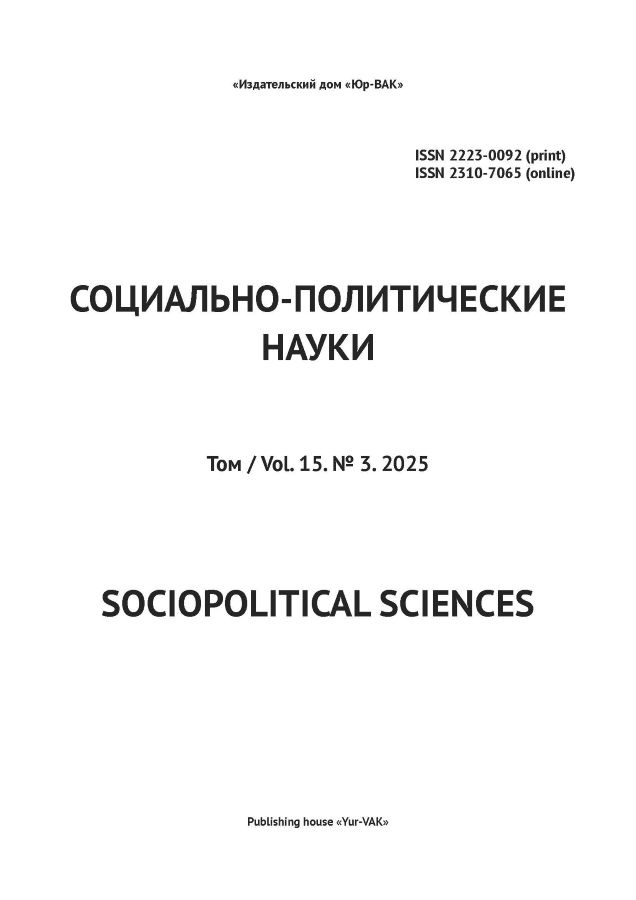Политические проблемы формирования цивилизационно-ориентированной образовательно-воспитательной системы в эпоху становления цивилизации знания и риска
- Авторы: Булавина М.А.1
-
Учреждения:
- Университет мировых цивилизаций имени В.В. Жириновского
- Выпуск: Том 15, № 3 (2025)
- Страницы: 51-58
- Раздел: Политические институты, процессы и технологии
- URL: https://journals.eco-vector.com/2223-0092/article/view/687838
- DOI: https://doi.org/10.33693/2223-0092-2025-15-3-51-58
- EDN: https://elibrary.ru/RNAXVB
- ID: 687838
Цитировать
Полный текст
Аннотация
В статье рассматриваются направления формирования цивилизационно-ориентированной образовательной системы. Автор отмечает, что на текущий момент все разрабатываемые прогнозы и создаваемые стратегии имеют тактический уклон независимо от того как они называются. Если же имеются попытки разобраться в «долгосрочности», «будущей неопределенности», «рисках жизнедеятельности», то обычно уходят в глобалистику невероятных масштабов. Автор констатирует, что сегодня культура разработки прогнозов и создания стратегий находится почти на нулевом уровне, но очень часто в проблеме прогнозирования и стратегического планирования не усматриваются вопросы образовательной политики. Традиционное образование сегодня стихийно и потому сложно и противоречиво трансформируется в проектное образование. В статье отмечается, что требуется создать принципиально отличающуюся по своему смысловому содержанию стратегию развития современной образовательно-воспитательной системы. Выбор траектории собственного развития из вспомогательной части образовательных технологий превращается в систему непрерывного слежения за достижениями личности, воззренологической основой построения индивидуальных траекторий движения вперед. Первостепенное внимание требуется уделять стратегическим прорывным технологиям в образовательно-воспитательной системе, которые в свою очередь порождены концептуальными изменениями в науке. Образование должно представляться как системный объект исследования, который развивается по законам интеллектосферы. Автор указывает на необходимость формирования педагогики шестого поколения, которая должна позволить изменить принципы развития образовательно-воспитательной системы с учетом смены существующего миропорядка и мироустройства как в нашей стране, так и во всем мире. При этом автором выделены как уже сформированные институты данного этапа, так и те, над которыми еще предстоит работать, выделены наиболее часто встречающиеся проблемы в образовательно-воспитательной системе.
Полный текст
Об авторах
Мария Александровна Булавина
Университет мировых цивилизаций имени В.В. Жириновского
Автор, ответственный за переписку.
Email: m.a.bulavina@uwc-i.ru
SPIN-код: 2292-4709
кандидат юридических наук, доцент; проректор по научной работе
Россия, МоскваСписок литературы
- Альбов А.П., Стукалова О.В. Современные направления и характеристики создания продуктивной системы управления качеством образования // Перспективы науки. 2019. № 9 (120). С. 133–136.
- Ардзинов В.Д., Чепаченко Н.В., Леонтьев А.А. Прорывные технологии: новые ориентиры развития экономики и общества // Экономика и управление. 2020. Т. 26. № 11 (181). С. 1227–1235.
- Берман Ф.А. Развитие интернет-технологий и их влияние на образование за рубежом // Актуальные проблемы социогуманитарных дисциплин: матер. конф. преподавателей и студентов ЧГПУ им. И.Я. Яковлева по итогам научно-исследовательской работы за 2023 г. Чебоксары, 2024. С. 32–43.
- Булавина М.А., Новосельский С.О. Роль высшего образования в обеспечении национальной безопасности Российской Федерации в условиях кризиса международных отношений // Тенденции развития системы международных отношений и их влияние на управление национальной обороной Российской Федерации. М., 2023. С. 76–83.
- Железняков С.С., Подосинников Е.Ю., Новосельский С.О. Реализация государственной информационной политики на муниципальном уровне // Инновационная экономика: перспективы развития и совершенствования. 2016. №7 (17). С. 96–106.
- Ищенко М.М., Сичкарь Т.В. Проблемы проектного образования в современной России // Вестник евразийской науки. 2019. Т. 11. № 1. С. 19.
- Кекеева З.О. Непрерывная система педагогического образования – реализация парадигмы высшего профессионального образования // Известия Волгоградского государственного технического университета. Серия: Проблемы социально-гуманитарного знания. 2007. Т. 3. № 4 (30). С. 78–80.
- Молчанов С.В., Кирсанов К.А., Пряжников Н.С. Особенности ценностных предпочтений у подростков с разным уровнем сформированности личной профессиональной перспективы // Вестник Московского гос. обл. ун-та. Серия: Психологические науки. 2019. № 4. С. 60–70.
- Новосельский С.О., Васюкова В.А., Марухленко А.Л. и др. Управление человеческим капиталом на региональном и корпоративном уровнях // Евразийский Союз: вопросы международных отношений. 2024. Т. 13. № 5 (58). С. 1029–1041.
- Половникова А.В. Создание системы национальной оценки качества образования в Российской Федерации и международные исследования // Актуальные вопросы гуманитарных наук: теория, методика, практика: матер. III Всерос. науч.-практ. конф. / под ред. А.А. Сорокина. 2016. С. 117–130.
- Попова С.А. Цивилизация знания и риска: проблемы построения перспективной образовательно-воспитательной сферы // Россия и мир: развитие цивилизаций. Уроки прошлого, угрозы будущего: матер. X междунар. науч.-практ. конф. М., 2020. С. 45–50.
- Проектное образование: организационные проблемы в условиях необходимости перехода к шестому технологическому укладу: коллективная монография / под ред. В.В. Жириновского. М.: Институт мировых цивилизаций, 2019. 246 с.
- Рязанцева М.В. Гибридная модель обучения: инновации и традиции // Вестник педагогических наук. 2024. № 2. С. 53–58.
- Савенкова Г.И., Гришина Н.В. Система оценки качества непрерывного профессионального образования // Профессиональное образование и общество. 2021. № 4 (40). С. 122–127.
- Шэнь М. Функции образования в контексте его современной модернизации // Научный аспект. 2023. Т. 5. № 3. С. 502–506.
Дополнительные файлы









